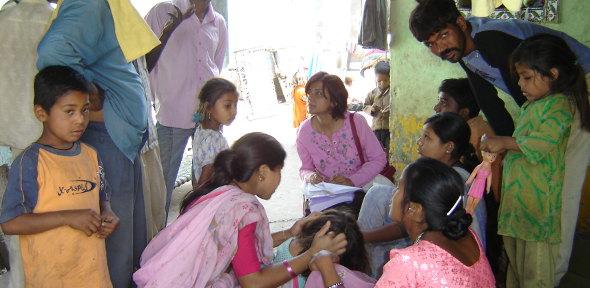
Dr. Priti Parikh completed her MPhil at the Centre for Sustainable Development here at the Department of Engineering from 2004-2005. Priti now works for Arup where she has launched ASPIRE. ASPIRE is a sustainability and poverty reduction assessment tool developed jointly by Arup and Engineers Against Poverty. Below she tells how she reached this point.
"My father (Prof. Himanshu Parikh) works in the slums and villages of India and has changed the lives of half a million people in Indore through water and sanitation provisions using a concept called Slum Networking. This inspired me to become an engineer. After graduation I started my career as a structural engineer designing retaining walls, beams, columns and domes for a five star hotel in Rajasthan. I then went on to working on infrastructure projects in slums and villages in India realising that the social impacts of engineering can be best achieved in those environments. The results emerging were so powerful and contrary to conventional wisdom that 5 years ago I decided to do my masters and doctorate in the Centre for Sustainable Development in the engineering department in Cambridge to analyse those findings under the supervision of Allan McRobie.
"During my doctorate I managed to carry out 700 socio-economic interviews in the slums of India and townships of South Africa to better understand the benefits of engineering interventions like water-sanitation infrastructure. Setting up the interviews, managing the logistics, finding the right team and analysing the evidence collected from the interviews was a big challenge and I learnt a lot during my field trips. My travel was supported by travel grants from the Department of Engineering, Newnham College, the Commonwealth Trust and the Institution of Civil Engineers. I also conducted semi-structured interviews which although full of humour nevertheless clearly highlighted the lack of basic services and the gap in engineering services in developing countries.
"My research demonstrates a few key points. Firstly, there is no cheaper, faster or better way to alleviate poverty in slums than by providing clean water and proper sanitation. My research shows that a one time expenditure of £100 per family on water and sanitation infrastructure had directly increased literacy rates of poor children (particularly girls) from 30% to 60%, reduced infant mortality and had almost doubled the incomes of the poor (particularly women) in 5 years, something India has been unable to achieve in the last 30 years.
"Secondly, I asked 700 families to prioritise their needs and they all came back with a single, clear response that water and sanitation is their top priority.
"Thirdly, it was noticeable that 5 years after the provision of water and sanitation infrastructure, the communities had rebuilt their huts into houses at an average investment of £1000- 1500 per family coming entirely from their own savings and family support. This was 10-40 times the initial investment by government on water and sanitation. The community cited the initial water and sanitation investment as the main catalyst for their own subsequent investment in housing.
"I am currently based in Arup where I have launched ASPIRE. ASPIRE is a sustainability and poverty reduction assessment tool developed jointly by Arup and Engineers Against Poverty through a two year collaboration. ASPIRE acknowledges the critical role of infrastructure in poverty reduction which is a prerequisite to achieving sustainable development in developing countries. I have also contributed to cutting edge thinking in Arup in relation to urban slums and low income housing.
"I was invited to be a panel member for the All Party Parliamentary Group for Engineering and Information Technology where I gave a speech about the role of engineering in international development. My speech discussed the impacts of engineering interventions on health, education, income and housing in developing countries and has been described as inspirational."
If you are interested in finding out more, please contact Dr. Priti Parikh by email: priti.parikh@cantab.net
More information on ASPIRE the new software-based tool for the integrated appraisal of the poverty reduction and sustainability performance of infrastructure developments can be found in the PDF here.

